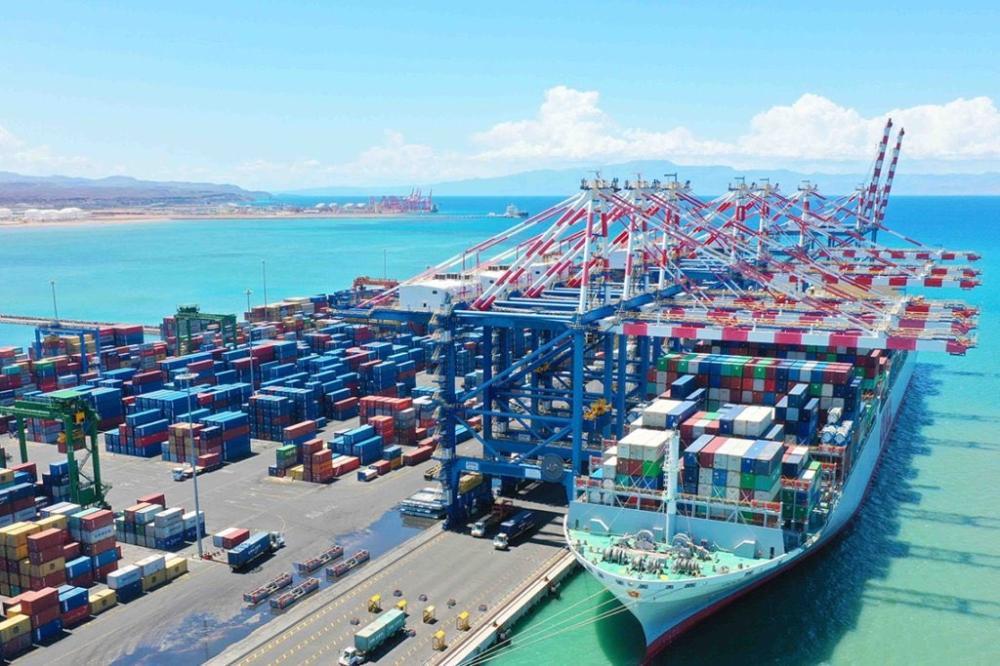Alice Kagina
Africa-Press – Rwanda. Rwanda has acquired land in foreign countries, notably in Djibouti, Kenya, and Tanzania and Central African Republic (CAR), primarily to facilitate trade and investment. However, most of these plots have been idle for years.
These plots are intended to support Rwanda’s import and export activities and boost its private sector by providing designated areas for businesses.
The government of Kenya gave Rwanda up to 12.8 hectares on the port of Mombasa in 1986, Tanzania gave the country up to 17.5ha at Isaka in 1984, and Djibouti gave two plots of land totaling 60ha to Rwanda in 2013 and 2017, near the Autonomous Port of Djibouti and the Dubai World International Port.
The land in Kenya and Tanzania, if fully utilized, could partly move Rwanda from the list of 16 landlocked countries in Africa to one of the immediate beneficiaries of the sea.
Walter Hunde Rubegesa, Spokesperson of Rwanda’s Private Sector Federation (PSF), said that the private sector is waiting for the state-to-state process of allocating land ownership so that businesspeople can proceed to acquire land titles and start developing them.
Abdul Ndarubogoye, President of the Rwanda Transporters Association and the CEO of TransAfrica Ltd, said that the plot in Kenya would be a good opportunity once developed to act as a Container Freight Station for imports, cutting the costs and fast-tracking customs procedures.
However, The New Times understands that the land in question given by the Kenyan government underwent litigation process with claims of illegal allocation, whereas the offer from Djibouti was later agreed to be changed to a space in a special economic zone.
According to Robert Bafakulera, Rwandan businessman, noted that the private sector cannot engage in any investment without the go-ahead from the government about the business environment readiness and tackling all the other issues involved. Bafakulera said there needs to be an understanding of the challenges impeding the utilization of each land offered by these countries.
“It requires clarity from the trade ministry about the ownership processes, mobilize investors, and clarify whether it’s the government or the private sector or maybe a partnership needed in developing the land. It has to be clear so that people can know the way forward,” he said.
Bafakulera is of the view that the only feasible approach to successful investments in these foreign land plots is through collective investments rather than individual investments.
“Individuals have tried and failed because of the intensive capital demand and the resilience or ability to navigate the business hurdles involved while overseeing the foreign and domestic businesses which requires an additional corporate muscle,” he said.
Doreen Ntawebasa, Director General of Trade and Investment in the Ministry of Trade and Industry, said that the country conducted feasibility studies to assess investment potential in these countries. The official said the studies for sites in Djibouti and Tanzania had been completed, while Kenya, Naivasha, is still under progress.
The Djibouti project started in June 2023 and completed in February 2024, Tanzania began in June 2024 and was completed in February 2025.
“These studies provided a comprehensive assessment of the investment potential and have recommended specific commercial activities to be developed on the land, including warehousing infrastructure, cold storage facilities, commercial centers and logistics hubs,” she said.
Following the completion of these studies, she added, the ministry engaged with a number of prospective investors and several of them have expressed interest in developing the designated plots in line with the recommendations outlined in the feasibility reports.
“We are currently waiting for the formal submission of their detailed business proposals, which will inform the next steps in the development and allocation process. In regard to the Central African plot, this one is being used by the private sector,” Ntawebasa said.
The allocation of land to another country is a complex process that involves national laws and institutional procedures.
So far, there are three interested potential investors, according to Ntawebasa. One is a Rwandan in joint venture with a foreign company, another one is foreign company but led by a Rwandan, and the last one is a foreigner.
Rwandan businesses face hurdles in CAR
While business opportunities are many in these countries and present potential to boost intra-African investments, Rwandan businesses decry trade barriers in the Central African Republic (CAR).
This is the country where Rwanda’s private sector has a presence and has taken a step in utilizing the gifted land, leveraging on the bilateral relations between both countries.
A Rwandan businessman with operations in CAR spoke to The New Times on condition of anonymity, and said that he had to buy additional land to now owning a total of 38,000ha, however, he has no land deed to show for it due to bureaucratic processes.
He invested in the agriculture sector and livestock farming whereby he says that initial investments in equipment and labour is more than Rwf3 billion. “CAR has a very fertile soil and rich in other resources. Many of us went there with investments in different sectors but majority have already left and a few of us remain.”
He alluded to different challenges, including the shortage of skilled labour, and irregular levies, among others.
The businessman said he had shared his concerns with the trade ministry and the PSF and was waiting for their response.
Trade ministry and PSF officials did not respond to The New Times requests for comment on the concerns raised about the site in CAR.
Source: The New Times
For More News And Analysis About Rwanda Follow Africa-Press






